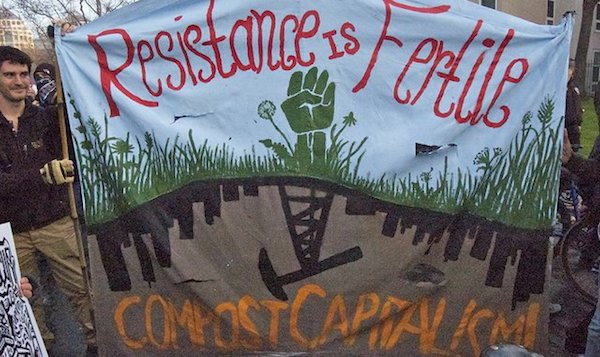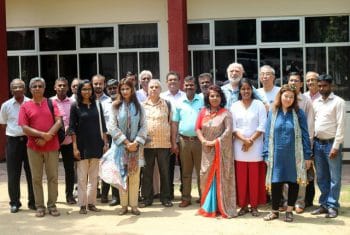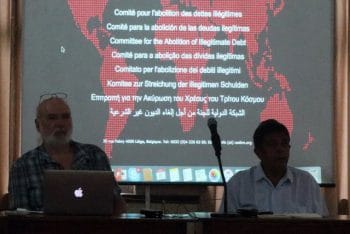The seventh CADTM South Asia regional workshop started in Colombo (Sri Lanka) on April 6, 2018, with participants coming from Sri Lanka, India, Pakistan, Bangladesh, Nepal, Japan, Belgium and France. Around forty people, most of them being representatives of social movements (peasants’ movements, feminism, trade unionism, etc.), came together for the first day of this three-day long programme. Four main topics were discussed on this day: the activities of the CADTM international network and the topics it focuses on; the public debt policies of Sri Lanka; the Chinese loans and investments in South Asia; and the big corporations’ debts on a global scale as well as with a focus on Indian corporations/ Below is the general introduction which was given by Éric Toussaint, spokesperson for the CADTM international network.
What we are fighting is a capitalist system that destroys nature.
We have to fight a capitalist system which, within the two centuries since the so-called Industrial Revolution, has accumulated enough greenhouse gases to trigger climate change.
It sees nature merely as resources to be extracted, exploited and traded for maximal profit.
A capitalist system that confines the inhabitants of many countries to producing raw material to be exported at the lowest possible price.
A system that drives people to produce food they will not eat and to eat food they have not produced.
A system that sets up and maintains nuclear plants which must urgently be shut down.
A capitalist system which perpetuates or even strengthens the oppression and exploitation of women. A capitalist system which perpetuates the cast system and racist policies.
A capitalist system which increases inequalities all over the planet.
A capitalist system which goes hand in hand with the debt system.
Illegitimate private debt
The debt system existed long before the capitalist system but it has thrived under capitalism.
Private debt has been used for millennia as a way of depriving peasants of their land, craftsmen of their tools. Slavery for debt was common during Classical Antiquity and is still existing in South Asia and other part of the world.
The system of illegitimate private debt usually involves imposing conditionHistory is littered with uprisings against the burden of illegitimate private debt, whether in Ancient Greece, in Northern Europe during the Middle-Ages or in Asia.
Those struggles against illegitimate debts are once more in spate:
![]() Peasants’ struggles for debt cancellation in India.
Peasants’ struggles for debt cancellation in India.
![]() Women’s struggles against microcredit in Morocco, Bangladesh and Sri Lanka.
Women’s struggles against microcredit in Morocco, Bangladesh and Sri Lanka.
![]() Students’ struggles against student debt in the U.S., Chile, Canada, Japan and in the UK.
Students’ struggles against student debt in the U.S., Chile, Canada, Japan and in the UK.
![]() Household struggles against abusive mortgages and house seizures in Spain, the U.S., Greece and in Ireland.s of loans and repayment that make the latter impossible. This results in seizure (of housing, land, working tools) and/or in the need to consign long years or indeed decades to repaying debts.
Household struggles against abusive mortgages and house seizures in Spain, the U.S., Greece and in Ireland.s of loans and repayment that make the latter impossible. This results in seizure (of housing, land, working tools) and/or in the need to consign long years or indeed decades to repaying debts.
Illegitimate public debt
The system of illegitimate debt is also used by the capitalist system to subject public policies to the demands of Capital. While public debt could be used to finance an ambitious programme of ecological transition and social justice… it is actually used to enforce anti-social, extractivist and productivist policies, policies that increase competition between peoples.
Public debt is not bad in itself. Governments can contract loans to finance the ecological transition:
![]() To finance the complete shutdown of nuclear plants.
To finance the complete shutdown of nuclear plants.
![]() To replace fossil energies with renewable energies which respect the environment.
To replace fossil energies with renewable energies which respect the environment.
![]() To finance land reform.
To finance land reform.
![]() To drastically reduce road and air transport and replace them with collective transport by rail.
To drastically reduce road and air transport and replace them with collective transport by rail.
Public borrowing can thus be legitimate if it is used to finance legitimate projects and if those who contribute act in a legitimate way.
The CADTM believes that big companies and the richer households should contribute to non profit-making government loans, i.e. with zero interest rate and without compensation against inflation.
At the same time, a part of the households of the popular classes which are able to spare money could make voluntary contributions to finance the state with a positive interest return rate (for instance, 3% real interest rate in favour of the savings of the popular families. If the rate of inflation is 4% a year, the nominal interest rate guaranteed by the government should be 7% in order to make sure that the real interest rate earned by these popular classes is 3%).
This mechanism would be highly legitimate as it would finance projects which are useful for society while reducing the wealth of the richest and simultaneously increasing the poorer classes’ revenues.
The opposite happens: governments and local authorities mostly borrow to finance illegitimate policies such as:
![]() Armaments expenses.
Armaments expenses.
![]() White elephants.
White elephants.
![]() Nuclear plants.
Nuclear plants.
![]() Public-private partnerships.
Public-private partnerships.
![]() Repayment of former illegitimate debts.
Repayment of former illegitimate debts.
![]() Bailing out banks.
Bailing out banks.
Public debt is thus used to finance illegitimate expenses. The way repayment of the debt is financed is illegitimate too: big companies and the richer households pay little or no taxes. Those on limited incomes have to tighten their belts to repay the debt. In the name of debt repayment, the state implements budget cuts in the social services, thus impacting the poor. Private banks grant loans to governments at profitable rates for themselves while they borrow at a very low rate from the central bank as is the case in the Eurozone or in Japan.
We can draw a straightforward conclusion: it is time to end the system of illegitimate public and private debt.
The CADTM is radically committed to fighting at local and international level with social movements and citizens toward the repudiation of illegitimate debts, whether public or private.
If public authorities with popular support wish to get involved, the CADTM is available and ready to help, for instance in the organization of citizens’ audits, as happened in Ecuador in 2007-2008, Paraguay in 2008 and Greece in 2015.
CADTM ASIA WORKSHOP 2018: INTERNATIONAL FINANCIAL INSTITUTIONS, DEBT AND MICROCREDIT, COLOMBO, 6-8 APRIL 2018
FRIDAY 6 APRIL
0900-0910: Registration
0910-0940: Welcome and Introductions
Sandun Thudugala – Law & Society Trust
Session 1: International Financial Institutions and Debt
Moderator: Linus Jayatilake – United Federation of Labour
0940-1000: Opening address: We struggle against illegitimate public and private debt
Eric Toussaint – CADTM spokeperson
1000-1030: Break
1030-1300:
![]() Japan: Nuclear Debt
Japan: Nuclear Debt
Tsutomo Teramoto – Osaka Education and Amalgamated Workers Union
![]() Sri Lanka: Debt Crisis or Debt Trap?
Sri Lanka: Debt Crisis or Debt Trap?
B. Skanthakumar – Social Scientists’ Association
1300-1400: Lunch
Session 2: Chinese Loans and Investments
1400-1600:
![]() Moderator: Vidya Dinker – President, Indian Social Action Forum
Moderator: Vidya Dinker – President, Indian Social Action Forum
![]() General Introduction
General Introduction
Au Loong Yu – Borderless (Hong Kong, China)
![]() Sri Lanka: Whose Pearl?
Sri Lanka: Whose Pearl?
B. Skanthakumar – Social Scientists’ Association
![]() Pakistan: Economic Corridor
Pakistan: Economic Corridor
Abdul Khaliq – CADTM Pakistan
1600-1630: Break
Session 3: Corporate Debt and its socio-economic impacts
1630-1800:
Moderator: Rabbiya Bajwa – Advocate, Supreme Court of Pakistan
![]() India
India
Sushovan Dhar – CADTM India
![]() Global Perspective
Global Perspective
Eric Toussaint – CADTM
1800: Close of Day 1
SATURDAY 7 APRIL 2018
Session 4: Microcredit, Women and Household Debt
0900-1100:
Moderator: Nalini Ratnarajah– South Asia Alliance for Poverty Eradication (SAAPE)
![]() Bangladesh
Bangladesh
Monower Mostafa – Coastal Livelihood and Environmental Action Network
![]() Japan: Student Debt
Japan: Student Debt
Tsutomo Teramoto – Osaka Education and Amalgamated Workers Union
![]() Sri Lanka
Sri Lanka
Niyanthini Kadirgamar – Collective for Economic Democratisation
1100-1130: Refreshments
Session 5: Peasant Debt, Farmer Suicides and Agrarian Crisis
1130-1330:
Moderator: Vimukthi de Silva– Movement for National Land and Agricultural Reform
![]() India
India
Sushovan Dhar– CADTM India
![]() Nepal
Nepal
Balram Banskota – All-Nepal Peasants Federation Association
![]() Pakistan
Pakistan
Zafar Lund – Advocate, High Court of Punjab
![]() Sri Lanka
Sri Lanka
M. K. Jayatissa – Progressive Farmers’ Association
1330-1430: Lunch
1430-1530: Peasant Debts: Q & A
1530-1600: Refreshments
Session 6: Multilaterals: New and Old
1600-1800:
Moderator: Fatima Khilji – Senior Lawyer
![]() Asian Development Bank Case-Studies: Nepal: Hydropower, Big Dams
Asian Development Bank Case-Studies: Nepal: Hydropower, Big Dams
Ratan Bhandari – Jal Sarkar (Water Governance)
![]() Sri Lanka: Northern Province Sustainable Fisheries Development Project
Sri Lanka: Northern Province Sustainable Fisheries Development Project
S. Vishvalingam – Sri Lanka Nature Group
![]() Asian Infrastructure Investment Bank
Asian Infrastructure Investment Bank
Hasan Mehedi – Coastal Livelihood and Environmental Action Network
![]() New Development Bank
New Development Bank
Eric Toussaint – CADTM
1800: Close of Day 2
SUNDAY 8 APRIL 2018
Session 7: Debt Audits: Campaigns against Illegitimate Debts
0900-1100:
Moderator: Marshal Fernando – Ecumenical Institute for Study and Dialogue
![]() Introduction
Introduction
Nathan Legrand – CADTM Secretariat
![]() Case Studies: Ecuador and Greece
Case Studies: Ecuador and Greece
Eric Toussaint – CADTM
1100-1130: Refreshments
1130-1300:
Moderators: Sushovan Dhar & B. Skanthakumar
Strategy & Planning: Perspectives for Debt Audits in South Asia
Close of Workshop
1300-1400: Lunch



